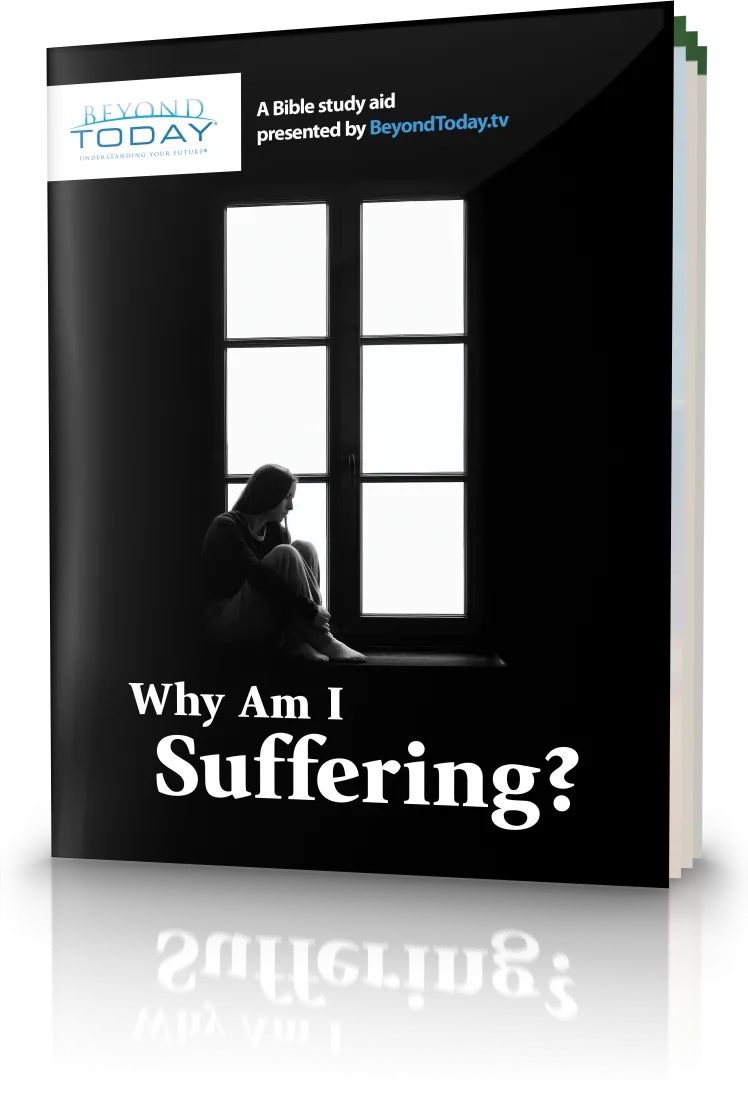Why Suffering? Where Does It Come From?

Why would God create a world of chaos and evil?
The truth is that God didn't. This isn't the world that God intended. God's original creation didn't contain these pains. The world God created was peaceful and beautiful. Food was easy to come by. There was no death. People were intended to have a close, personal relationship with God. God gave us free will. God gave us choices.
When our ancestors, Adam and Eve, chose the tree of the knowledge of good and evil, they chose to disobey God. They rejected His design for the world. In doing so they chose this chaotic world and all the problems we have today. In the world they chose there was the curse of cause and effect, time and chance. Bad decisions now can affect generations to come. Satan became the ruler of this world. We inherited a painful world chosen by our ancestors.
Whether you're in the middle of a trial now or in a period of relative peace in life, it's helpful to understand why suffering exists at all.
Paul Johnson, a famous author, once asked: "If God is infinitely good, and infinitely powerful too, why should evil exist at all?" That question is one we all want answered.
God reveals why He allows suffering to exist in our world today. One inescapable aspect of human life is our free will—our freedom of choice, our free moral agency—that provides the key to understanding why God allows evil and suffering to exist.
"The tree of life was also in the midst of the garden, and the tree of the knowledge of good and evil" (Genesis 2:9).
The first book of the Bible talks about two trees God created (Genesis 2:9). One represented the way to life and blessings. The other tree held the way to suffering, anguish and death. God gave Adam and Eve a choice of the two trees. He explained the consequences of choosing either tree. He even commanded them not to make the wrong choice (Genesis 2:15-17; compare Genesis 3:3).
Just like we so often do, Adam and Eve made the wrong choice. "So when the woman saw that the tree was good for food, that it was pleasant to the eyes, and a tree desirable to make one wise, she took its fruit and ate. She also gave to her husband with her, and he ate" (Genesis 3:6).
Although God warned them not to eat of the fruit of the tree of the knowledge of good and evil, He didn't keep Adam and Eve from making a wrong choice. God created them both in His own image. He gave them freedom to choose like He does.
Because God wants us to be like Him, He gave us the ability to choose what we do. Without making right choices, we can't build righteous character, the same character He has. To build character, we need to make wise choices. We must choose between right and wrong, wisdom and foolishness, carelessness and vigilance.
All actions have consequences. Some consequences are good, and some are bad.
Consequences and Time and Chance
Every day we hear news of tragic accidents or terrible events that cause suffering. Tornados level schools, earthquakes kill thousands, bombs go off in crowded marketplaces. We ask ourselves why these terrible things happen.
Then sometimes it hits closer to home. It's our home that's hit by a tornado; it's our loved one in a horrible car accident. We're left with one inescapable question: How can something like this happen? Where does the suffering each of us and our families go through come from? As much as people try to look within themselves to understand, they have to admit they have no real answers.
The biblical King of Israel, Solomon, faced the same issues and questions a long time ago and in a very different place. He saw the futility of life when tranquility was shattered by random acts of human nature or even nature itself. He concluded, "One thing happens to all" (Ecclesiastes 9:3), and that evil and madness do exist. Much of what takes place is subject to events beyond our control.
Solomon recorded his thoughts on this topic in a book called Ecclesiastes. In a lot of ways it's a journal of a person who spent his life searching for the same answers we look for today. He looked around and he saw evil and suffering, righteousness and pleasure. He participated in all of it just to find out what worked best for him. He had enough money to buy and build whatever he desired. He searched for the wisdom of his day, compiled and studied it and was considered by all his peers to be the wisest of all.
Solomon no doubt witnessed actions of violence and unexplainable natural catastrophe that took countless lives. No one had answers, not even the wisest man alive. Why evil? Why suffering?
In all of his observations and meditations he concluded that there is such a time as "time and chance," and that suffering can result from seemingly random events. He concluded "The race is not to the swift, nor the battle to the strong, nor bread to the wise, nor riches to men of understanding, nor favor to men of skill; but time and chance happen to them all. For man also does not know his time; like fish taken in a cruel net, like birds caught in a snare, so the sons of men are snared in an evil time, when it falls suddenly upon them" (Ecclesiastes 9:5-12).
This statement is real, and it gives understanding beyond the headlines and events of this life. Time and chance, events of life beyond our control and completely unrelated to our moment occur, and we are all at times caught in a net and in that moment are like the fish or the birds—life snuffed out and seemingly without meaning.
And yet, there is meaning. There is hope in Solomon's conclusion about the affairs of all life on this realm called earth. "Let us hear the conclusion of the whole matter: Fear God and keep His commandments, for this is man's all. For God will bring every work into judgment, including every secret thing, whether good or evil" (Ecclesiastes 12:13-14).
There is a God, and His judgment is a fact of life. Judgment is part of the hope of this life for without it there is no hope of justice. It is when life is darkest and despair the sharpest that the hope of God's justice offers a glimmer of light to pierce the gloom. That is what Solomon concluded after a lifetime of reflection.
Satan Causes Suffering
While Solomon's conclusion about time and chance in suffering is true, it's not the only source of suffering in our lives. Sometimes terrible tragedies and situations that cause us suffering come from a very real being who exists only to cause harm to people.
Jesus Christ spoke of one He called "a murderer from the beginning" and "a liar and the father of lies" (John 8:44, New Revised Standard Version). Jesus identifies the origin of evil and suffering. The suffering you and all people go through comes from a being who first lied, deceived, hated and murdered. He is the enemy of mankind, Satan the devil (1 Peter 5:8).
The Bible tells us he was once a glorious angel whose name, Lucifer (Isaiah 14:12), meant "light-bringer." God said that Lucifer was "the seal of perfection, full of wisdom and perfect in beauty." He was "in Eden, the garden of God; every precious stone was your covering...You were the anointed cherub who covers; I established you; You were on the holy mountain of God; you walked back and forth in the midst of fiery stones. You were perfect in your ways from the day you were created, till iniquity was found in you" (Ezekiel 28:12-15).
Something changed deep within Lucifer. God told him: "How you have fallen from heaven, O morning star, son of the dawn! You have been cast down to the earth, you who once laid low the nations! You said in your heart, 'I will ascend to heaven; I will raise my throne above the stars of God; I will sit enthroned on the mount of assembly, on the utmost heights of the sacred mountain. I will ascend above the tops of the clouds; I will make myself like the Most High'" (Isaiah 14:12-14, New International Version).
Lucifer convinced himself he was as good as or better than his Maker. He rebelled against God and tried selfishly to put himself above the other angels (Revelation 1:20). Where does violence, anger and hatred come from? God said that Satan became "filled with violence" (Ezekiel 28:16-17). His attitude of selfishness and anger has influenced people throughout time. Because he hates God, he does what he can to make God's children suffer.
Although the Bible introduces Satan when he deceived Eve in the Garden of Eden (Genesis 3:1-24), he has been around far longer. He was the first criminal, a being whose mind and thinking grew corrupt, twisted and perverse. He introduced evil into the world. Humanity has struggled against evil ever since.






